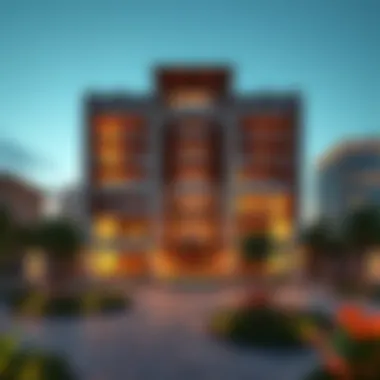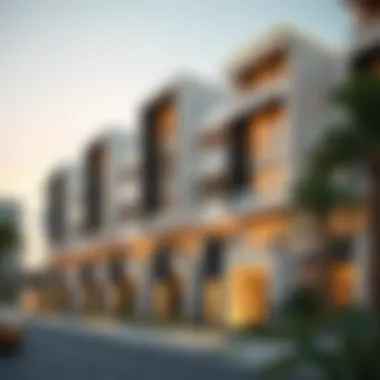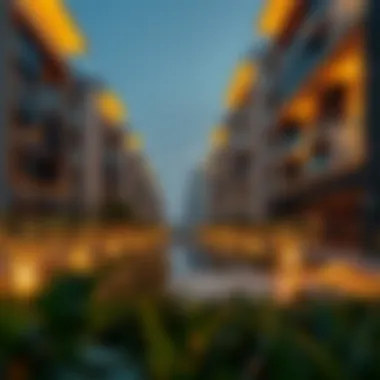Dubai Residential Landscape: Trends and Opportunities


Intro
Dubai’s residential landscape offers a captivating blend of modernity, luxury, and dynamic opportunities. As people from various cultures converge in this city, the stakes in the real estate market grow higher, which creates a unique environment for investors and homeowners alike. Understanding the nuances of this market is not just beneficial but essential for anyone looking to dive into Dubai's residential offerings.
In recent years, the demand for housing has surged, driven by a myriad of factors including economic stability, a booming expatriate community, and various government initiatives aimed at facilitating property ownership. With developers consistently raising the bar, the variety of residences available ranges from high-end villas to budget-friendly apartments, each catering to a specific segment of buyers.
As we navigate through this article, we will explore the current trends defining the market, identify up-and-coming neighborhoods ripe for investment, and examine the pros and cons of buying versus renting in this vibrant metropolis. So, whether you are a seasoned investor looking to expand your portfolio or a first-time homeowner trying to find the perfect nesting place, this comprehensive guide will shed light on navigating the complexities of Dubai’s rejuvenated residential sector.
Intro to Dubai’s Residential Market
The residential market in Dubai is unlike any other. With its blend of avant-garde architecture, affluent lifestyle, and ever-evolving demographic, it presents a captivating landscape for those interested in property investment and homeownership. Understanding this market is key for investors, homeowners, and real estate professionals alike. The evolution and direction of Dubai’s housing scene directly reflect economic shifts, cultural dynamics, and urban development strategies.
From sprawling villas in Palm Jumeirah to high-rise apartments in Business Bay, each area showcases a different facet of what makes Dubai an attractive destination for residency. The market isn't just about physical structures; it encapsulates a lifestyle choice that appeals to people from various backgrounds and financial capacities.
Moreover, the importance of this market has surged in recent years, driven by factors like globalization, tax advantages, and advancements in infrastructure. Such developments have enhanced not just the desirability of residences but also their potential for returns on investment. Investors seeking a foothold in a growing economy find themselves drawn to this unique marketplace.
The intricacies of Dubai’s residential market also mean that understanding local trends is essential. Homebuyers and investors alike need to keep their ears to the ground, as preferences can shift rapidly due to global influences or local legislative changes. For instance, with new visa regulations for investors and expats, there has been a noticeable surge in demand, reshaping neighborhoods and impacting property values.
Key Aspects of the Dubai Residential Market
- Diverse Offerings: Ranging from luxury apartments to more modest accommodations, there’s something for everyone.
- Cultural Melting Pot: The influx of expatriates enriches community life and influences architectural styles.
- Investment Appeal: Favorable regulations encourage foreign investment, fueling the market's dynamism.
In view of these elements, this section lays the groundwork for a deeper exploration into the increasingly complex landscape of Dubai’s residential offerings. It sets the stage for an analysis of historical context, current trends, regulatory concerns, and investment prospects. By examining these areas, the article intends to equip readers with the necessary insights to navigate an ever-changing real estate market effectively.
"Dubai's residential market serves not just as a place to live but as a unique avenue to experience cultural exchange and economic growth."
Historical Context of Housing in Dubai
Understanding the historical context of housing in Dubai is essential for appreciating the contemporary residential landscape. The city's rapid transformation from a modest fishing village to a global metropolis has created unique residential challenges and opportunities. By looking into the past, we can gain insights into current trends and project future developments.
Evolution of Residential Architecture
Dubai's architectural evolution reflects its dynamic socio-economic changes. In the early years, most homes were simple structures made from palm fronds, mud, and coral. This rudimentary architecture catered to the local climate and lifestyle, focusing on practicality rather than extravagance.


As oil was discovered in the 1960s, a dramatic architectural shift began to take place. The influx of wealth and global attention spurred the construction of modern high-rises and luxury villas. Today, Dubai boasts an eclectic mix of residential styles, ranging from opulent Arabian palaces to minimalist contemporary condos.
Aditionally, designers have incorporated sustainable practices into new developments. High-rise towers now blend cutting-edge technology with traditional elements, creating a unique identity. For instance, the Burj Khalifa exemplifies the blend of innovation and cultural heritage, standing not just as an architectural marvel but as a symbol of Dubai's soaring ambitions.
Impact of Economic Changes
The economic landscape has significantly influenced housing in Dubai. The 2008 financial crisis was a pivotal moment, leading to a stark adjustment in the real estate market. Property values plummeted, and many homeowners found themselves in precarious situations. This volatility prompted the government to introduce more stringent regulations to stabilize the market, which has led to increased investor confidence over the years.
In recent times, recovery from the crisis has been marked by a vigorous real estate revival. The introduction of various visa initiatives targeted at foreign investors has further stimulated demand. The UAE government’s commitment to diversifying its economy, with tourism and hospitality becoming cornerstones, has bolstered the housing sector. As a result, urban developments have flourished, particularly in suburbs and emerging neighborhoods, leading to a diversified housing stock that caters to different economic brackets.
In summary, the historical context of housing in Dubai showcases how deeply intertwined architecture, economy, and culture are. By analyzing past trends, investors and homeowners alike can anticipate future developments in the residential market, allowing them to make informed decisions.
Current Trends in Residence Preferences
In the ever-evolving landscape of Dubai’s real estate, understanding current trends in residence preferences is essential. A deep look into this area illuminates how tastes are shifting, influenced by various factors ranging from demographic changes to economic conditions. For buyers and investors, keeping a finger on the pulse of these trends is vital for making informed decisions.
Popular Neighborhoods
Dubai boasts a variety of neighborhoods, each with its own unique charm and character. Recently, areas such as Dubai Marina, Downtown Dubai, and Jumeirah Lake Towers have garnered significant attention from both expats and local residents.
- Dubai Marina is often seen as the epitome of luxury, with its stunning waterfront views and vibrant nightlife. Many young professionals and families are drawn to this area, partly due to its proximity to workplaces and leisure facilities.
- Downtown Dubai offers a bustling lifestyle with attractions like the Burj Khalifa and Dubai Mall. Here, residents enjoy easy access to shopping, dining, and cultural experiences, making it a favorite among those desiring cosmopolitan living.
- Jumeirah Lake Towers has transformed significantly, offering affordable living options paired with convenient amenities. It’s becoming a favored choice for families looking for community-focused environments without breaking the bank.
These neighborhoods exemplify how location preference is intertwined with lifestyle choices, thus shaping buyer behavior.
Luxury vs. Affordable Housing
Dubai's market is often seen as a tug-of-war between luxury and affordable housing. On the one hand, there’s a thriving luxury segment characterized by high-end properties in locations like Palm Jumeirah and Business Bay. Investors often dive into this segment expecting solid returns, as demand remains high among affluent buyers and renters.
On the other hand, affordable housing is increasingly becoming a matter of necessity. With a growing population and shifting demographics, many new residents are seeking budget-oriented options. This push has led developers to construct more mid-range properties, catering to both young professionals and families. Locations such as Dubai South are rolling out projects that combine quality living with affordability.
With the renovation of older neighborhoods to meet modern standards, the market is expanding, offering something for everyone.
Regulatory Factors Influencing Residency
Understanding the regulatory landscape governing residency in Dubai is vital for anyone considering investing in its residential sector. The legal framework set out by the government shapes everything from property ownership rights to investment incentives. As the emirate continues to attract foreign investors and residents alike, grasping these nuances can be the key to making informed, strategic decisions in an evolving market. This section dives into two primary regulatory elements: visa policies for investors and ownership laws for foreigners.


Visa Policies for Investors
The visa policies for investors play a significant role in shaping the residential market. In recent years, Dubai's government has implemented several initiatives aimed at simplifying and enhancing the investor experience.
- Long-term visas: Investors can obtain a long-term residence visa, typically up to ten years, when investing in property valued at a certain threshold—generally around AED 2 million (approximately USD 540,000). This move not only incentivizes foreign investment but also encourages affluent individuals to settle in the region.
- Ease of application: The process for obtaining these visas has been streamlined, making it easier for potential buyers to navigate through the bureaucratic hurdles. Investors are required to submit necessary documentation and undergo a straightforward background check, which adds to the appeal of Dubai as an investment destination.
- Dependents and family: Furthermore, successful visa applicants can extend these benefits to their family members, effectively transforming Dubai into a family-friendly option for global investors. This practice signifies a long-term commitment to nurturing a diverse and multicultural community.
Understanding these policies can empower foreign investors to capitalize on opportunities that may arise from their residency, whether it's through participating in the property market or simply enjoying the luxuries Dubai has to offer.
Ownership Laws for Foreigners
Property ownership regulations in Dubai vary significantly from other international markets, elevating its real estate value and attraction among expatriates. Here's a deeper look into the key components influencing ownership laws for foreigners:
- Freehold vs. Leasehold: Foreigners can own property on a freehold basis in designated areas, meaning they have absolute ownership rights. Conversely, in leasehold areas, non-UAE nationals may lease property for a maximum of 99 years. This distinction is paramount in choosing where to invest. Familiarizing oneself with the designated freehold zones can yield significant benefits.
- Registration and Fees: Foreign buyers must register their property with the Dubai Land Department (DLD), which entails certain costs. There’s typically a registration fee amounting to 4% of the property's purchase price, alongside additional administrative fees. Despite these expenses, the rewards of property appreciation in Dubai often outweigh these initial costs for savvy investors.
- Restrictions and obligations: It’s also important to note that foreign ownership is subject to certain restrictions in specific locations, and understanding these can prevent unexpected challenges down the line. For example, not all properties are eligible for foreign ownership, and it's essential to consult local regulations before proceeding with any purchase.
Understanding the local regulations is like reading the fine print of a contract. Ignoring it could lead to unexpected consequences.
Navigating these laws is essential for prospective investors seeking to tap into Dubai's robust property market while ensuring compliance with local regulations. Foreign ownership laws foster an inclusive environment, enabling Dubai to solidify its position as a global real estate hub.
Investment Opportunities in Dubai Residences
Investing in Dubai's residential market has proven to be a lucrative venture for many, given the region's vibrancy, strategic location, and an ever-evolving urban landscape. The importance of this topic is underscored by the city’s reputation as a melting pot of nationalities, where a multitude of cultures converges, bringing with it diverse housing demands. Recognizing the trends in this field allows investors to make informed decisions, capitalizing on the unique aspects of Dubai's real estate sector while mitigating potential risks.
Key elements to consider when exploring investment opportunities include:
- Market Research: Conduct thorough analysis of current market trends to identify promising investment areas.
- Regulatory Framework: Understanding local laws governing property ownership, especially for foreigners, can influence investment success.
- Rental Yields: Tracking rental yields can reveal profitable neighborhoods and determine if the investment aligns with financial goals.
Investing in residential properties in Dubai isn’t merely about real estate; it involves understanding the intricate dynamics that shape the market. The benefits of engaging in such investments include potential for capital appreciation, high rental returns, and the safety of your assets in a politically stable environment. However, investors should remain cognizant of considerations such as market volatility and changing regulations, which can impact long-term gains.
Hotspots for Property Investments
Among the numerous districts in Dubai, a few stand out as hotspots for property investment. These areas are experiencing rapid development, a surge in demand, and strong potential returns for investors. Some notable hotspots are:
- Dubai Marina: A cosmopolitan waterfront community known for its upscale living and vibrant lifestyle, it continues to attract expatriates and investors alike.
- Jumeirah Village Circle (JVC): Offers affordable options with a range of amenities, making it popular for both investors and residents.
- Downtown Dubai: Home to iconic landmarks such as the Burj Khalifa, the demand for residences here remains steadfast, appealing to both luxury buyers and investors.


"Invest in areas where infrastructure is projected to expand, as this often correlates with property value appreciation."
Each of these locations provides distinct benefits, whether it's vibrant nightlife, community feel, or proximity to the central business district. Investors should align their preferences with their investment goals—they may prioritize return on investment, lifestyle integration, or even long-term capital gains.
Emerging Markets and Neighborhoods
In addition to established areas, Dubai is dotted with emerging neighborhoods that are poised for growth. Identifying these locations can lead to significant financial benefits for early investors. Areas such as:
- Al Furjan: An up-and-coming residential community with a mix of villas and apartments, it’s gaining popularity among families seeking a suburban lifestyle.
- Meydan City: Known for its luxurious golf course and residential developments, this area is attracting investors with its potential for high returns as more amenities converge.
- Dubai South: Positioned to become the future hub of trade with the Expo 2020 legacy, it promises an abundance of residential opportunities and infrastructural advancements.
Investors should monitor these neighborhoods closely, as they often present the best chance for capitalizing on lower prices before demand drives values up significantly. It’s essential to engage with local real estate professionals who possess intimate knowledge of these emerging areas, ensuring investments are driven by consistent data and trends.
Financial Insights on Property Purchases
Understanding the financial aspects of property purchases in Dubai is essential for anyone eyeing this vibrant market. For investors and homeowners alike, knowing the ins and outs of property financing can make the difference between a sound investment and a financial misstep. This section focuses on two critical areas that significantly impact purchasing decisions: mortgage options and calculating the return on investment (ROI).
Mortgage Options and Trends
The mortgage landscape in Dubai has evolved considerably, reflecting global trends while accommodating the local environment. Here are key highlights to consider:
- Diverse Lending Options: Homebuyers can explore several mortgage products—fixed-rate, variable-rate, and even Islamic financing options tailored for Muslim buyers. Each type serves different financial situations and risk tolerances.
- Eligibility Criteria: While getting a mortgage in Dubai isn't overly complicated, potential borrowers must meet specific criteria, such as a minimum income level, credit history, and residency status. For instance, expatriates often face different rules than UAE nationals, impacting both application processes and interest rates.
- Down Payments: In most cases, down payment requirements can range from 20% to 25% of the property's value for non-residents—much higher compared to many other global cities.
- Trends in Interest Rates: Market conditions influence mortgage interest rates, so it's crucial to stay informed. The rates have seen fluctuations recently, influenced by global economic shifts and the Federal Reserve's decisions.
Sifting through various mortgage options can feel like navigating a labyrinth, but it's an endeavor worth undertaking. A well-chosen mortgage lays a strong foundation for future financial health.
Calculating Property Investment Returns
Investing in property isn't simply about what you pay or borrow; it's about understanding the bigger financial picture. Calculating the returns involves more than just how much money comes in from rental income. Here’s a closer look:
- Net Operating Income (NOI): This is a crucial figure. It’s calculated by subtracting operating expenses from gross income. When evaluating a property, knowing it can significantly affect your investment's attractiveness.
NOI = Gross Income - Operating Expenses
Cap Rate = NOI / Current Market Value
Cash on Cash Return = Annual Pre-Tax Cash Flow / Total Cash Invested







